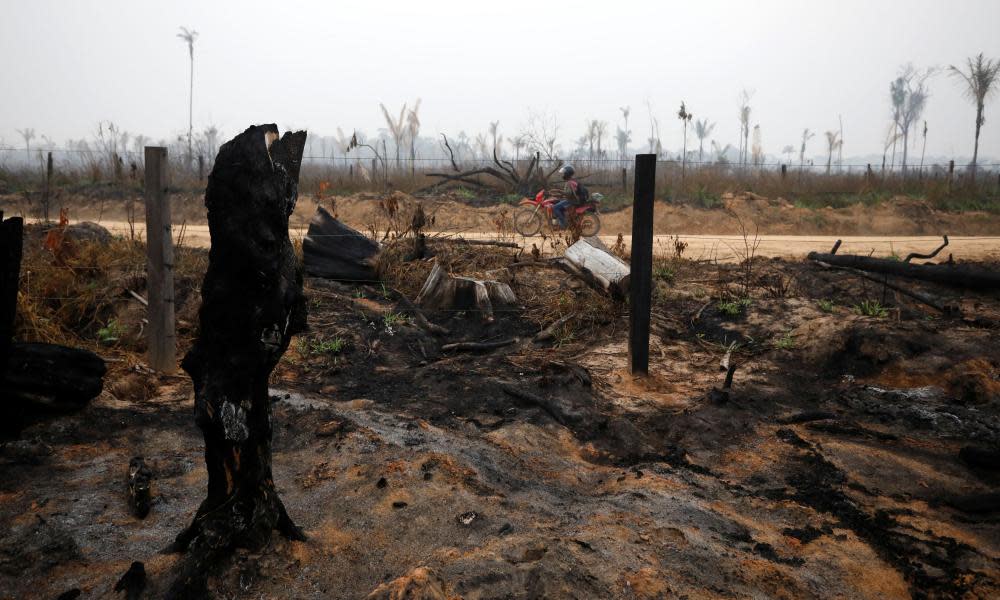The Observer view on Jair Bolsonaro and the Amazon wildfires

Smoke from the wildfires burning in the Amazon plunged São Paolo, 1,700 miles from the scenes of destruction, into an eerie darkness last Monday afternoon. The temporary blackout made it impossible for residents of Brazil’s largest city to ignore the ecological carnage taking place on the other side of their country. But the ruin of rainforest we are currently witnessing will reverberate far beyond the borders of Brazil in decades to come.
Home to 3m species – one in 10 of all known plants and animals on Earth – the Amazonian rainforest is the most biodiverse place on the planet. Three-quarters of plant species there are unique to the rainforest. The Amazon is also home to a million indigenous people, thousands of whom have lost their lives in recent decades defending the forest against commercial interests.
The rainforest plays a critical role in regulating the Earth’s climate, absorbing millions of tonnes of carbon dioxide a year. Halting deforestation is no less important than eliminating fossil fuel use in terms of avoiding catastrophic global overheating; scientists have estimated that protecting and restoring rainforests could reduce carbon emissions by 18% by 2030.
Much, then, is at stake. For decades, the Amazon has been the site of a struggle between, on one hand, conservationists and indigenous people, who are desperate to protect the forest, and, on the other, Brazil’s business lobby, which sees lucrative potential in its destruction to make way for farming, mining and logging. For a decade, it looked as though the conservationists were winning as the rate of deforestation declined. But in the past five years, that trend has reversed with the growing influence of Brazilian agribusiness. And since the election of Jair Bolsonaro, dubbed “Captain Chainsaw” for his support of Amazonian deforestation, it has sharply accelerated.
Related: Brazilian protesters rail against Bolsonaro as Amazon fires rage on
Bolsonaro has thrown his support behind Brazil’s agricultural industry and the commercial exploitation of the Amazon. Enforcement action aimed at protecting the forest has dwindled since his election. Emboldened, farmers have declared “fire days”, deliberately setting fire to chunks of the forest in order to destroy it so it can be used to graze cattle. Bolsonaro has responded by rubbishing satellite data from Brazil’s own space agency, which shows that an area the equivalent of five football pitches was cleared every minute in July, a 278% rise on the same month last year. He accused its head of “peddling lies” and sacked him earlier this month. Last week he also made the preposterous suggestion –without any evidence – that environmental NGOs had started the fires to make the government look bad.
A fifth of the Amazonian biome has been irrevocably lost. And the current destruction takes the rainforest closer to a tipping point. Scientists had thought this point – at which the Amazonian ecosystem will have degraded to the extent that it can no longer sustain itself, and large swathes of forest will simply evolve into a dry savannah – was 20 to 25 years away. They now believe that if the accelerated deforestation of recent months continues, it will loom closer. It risks the extinction of thousands of species, not to mention eliminating any chance of limiting global heating to less than 1.5C above preindustrial levels.
How should the international community respond? The situation is complicated by the fact that Bolsonaro is not the only rightwing populist to threaten the global action needed to avert catastrophic overheating of the planet. He is cut from the same cloth as Donald Trump, who has rejected scientific evidence about the climate crisis, withdrawn the US from the Paris agreement and reversed Obama administration policies to reduce domestic carbon emissions.
But while a lack of concern for biodiversity and the climate crisis may be a common feature of rightwing populists, it is not necessarily the most popular plank of their agenda, driven instead by close links with business. In Brazil, for example, polls show that the vast majority of Brazilians want the Amazon to be protected.
This suggests that there is scope for international pressure to work. Ahead of this weekend’s G7 summit, France and Ireland – in truth, likely motivated by their own trading interests as well as concern for the Amazon – threatened to veto the EU-Mercosur trade deal that is agreed but yet to be ratified. Bolsonaro has continued to condemn international intervention in what he has labelled an “internal issue”, accusing Macron of a “colonial mindset”. But away from the high-octane rhetoric, he appears to have responded and has ordered the Brazilian army to help fight the fires.
It’s all very well for European governments to condemn Bolsonaro, but western demand for Brazilian beef is contributing to deforestation. The EU imported more than £490m worth of beef from Brazil last year. Consumers in Britain were indirectly responsible for the destruction of the equivalent of 500 football pitches of rainforest in Brazil last year; Italy, four times as much. Under the terms of the Mercosur agreement, that will go up. The EU must use its power as Brazil’s second biggest export market to insist that the agreement cannot go ahead unless Bolsonaro steps up enforcement action against illegal deforestation.
Strong-arming less affluent nations into action through trade deals is not, by itself, enough. Wealthier countries in Europe need to do far more when it comes to stumping up proper resources for overseas conservation, an area of spending that governments have found it too easy to skimp on.
Environmental rhetoric comes cheap. Only the coming months will tell if European leaders are prepared to take the action that is needed to support those Brazilians who are battling to protect the Amazon and the unique role it plays in safeguarding a biodiverse, sustainable planet for future generations.

 Yahoo News
Yahoo News 
